
On July 1, 1990, pitcher Andy Hawkins became the first Yankee ever to lose despite throwing a no-hitter. Third baseman Mike Blowers committed an error, followed by two walks and an error by the left fielder Jim Leyritz with the bases loaded, scoring all three runners and the batter. The 4–0 loss to the Chicago White Sox was the largest margin of any no-hitter loss in the 20th century. Ironically, the Yankees (and Hawkins) were no-hit for six innings in a rain-shortened game against the White Sox eleven days later.
During the 1990 season, Yankee fans started to chant "1918!" to taunt the Red Sox, reminding them of the last time they won a World Series one weekend the Red Sox were there in 1990.[26] Each time the Red Sox were at Yankee Stadium afterward, demeaning chants of "1918!" echoed through the stadium.[27] Yankee fans also taunted the Red Sox with signs saying "CURSE OF THE BAMBINO", pictures of Babe Ruth, and wearing "1918!" T-shirts each time they were at the Stadium.[27]
The poor showings in the 1980s and 1990s would soon change. Steinbrenner hired Howard Spira to uncover damaging information on Winfield and was subsequently suspended from day-to-day team operations by Commissioner Fay Vincent when the plot was revealed. This turn of events allowed management to implement a coherent acquisition/development program without owner interference. General Manager Gene Michael, along with manager Buck Showalter, shifted the club's emphasis from high-priced acquisitions to developing talent through the farm system. This new philosophy developed key players such as outfielder Bernie Williams, shortstop Derek Jeter, catcher Jorge Posada, and pitchers Andy Pettitte and Mariano Rivera. The first significant success came in 1994, when the Yankees had the best record in the AL, but the strike ended the season and Mattingly's best chance for a World Series title and is remembered among the 10 worst moments in New York City sports history.[28][29] Because the Yankees were last in a postseason in a season cut short by a strike, the news media constantly reminded the Yankees about the parallels between the two Yankee teams (1981 and 1994), which included both Yankee teams having division leads taken away by strike.[30][31] Throughout October, the media continued to speculate about what might have been if there had not been a strike, making references to the days games in the post-season would have been played.[32]
A year later, the team qualified for the playoffs in the new wild card slot in the strike shortened 1995 season. In the memorable 1995 American League Division Series against the Seattle Mariners, the Yankees won the first two games at home and dropped the next three in Seattle. Mattingly, suffering greatly from his back injury, retired after the 1995 season. He had the unfortunate distinction of beginning and ending his career on years bookended by Yankee World Series appearances (1981 and 1996).
New Dynasty (1996–2007)
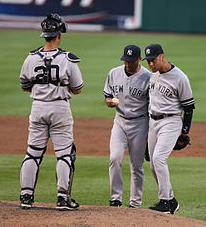
The Yankees have maintained acore of productive players in their winning seasons since 1997, including Jorge Posada, Mariano Rivera, and Derek Jeter.
Torre had a mediocre run as a manager in the National League,[33] and the choice was initially derided ("Clueless Joe" was a headline in the New York Daily News).[34] However, his calm demeanor proved to be a good fit, and his tenure was the longest under George Steinbrenner's ownership.
1996 saw the rise of three Yankees who would form the core of the team for years to come: rookie shortshop Derek Jeter, second-year starting pitcher Andy Pettitte, and second-year pitcher Mariano Rivera, who served as setup man in 1996 before becoming closer in 1997. Aided by these young players, the Yankees won their first AL East title in 15 years in 1996. They defeated the Texas Rangers in the ALDS, and in the ALCS beat the Baltimore Orioles in five games, which included a notable fan interference by young Jeffrey Maier that was called as a home run for the Yankees. In the World Series the team rebounded from an 0–2 series deficit and defeated the defending champion Atlanta Braves, ending an 18-year championship drought. Jeter was named Rookie of the Year. In 1997, the Yankees lost the 1997 ALDS to the Cleveland Indians in five games. GM Bob Watson stepped down and was replaced by assistant GM Brian Cashman.
The 1998 Yankees are widely acknowledged to be one of the greatest teams in baseball history, compiling a then-AL record 114 regular season wins against just 48 losses and then sweeping the San Diego Padres in the 1998 World Series. Their 125 combined regular and postseason wins is an MLB single season record. However, this was the only Yankees World Series championship during this dynasty that wasn't won against either the New York Mets or the Atlanta Braves.[35]
On May 17, 1998, David Wells pitched a perfect game against the Minnesota Twins at Yankee Stadium. On July 18, 1999, which was "Yogi Berra Day" at the Stadium, David Cone pitched a perfect game against the Montreal Expos. The ALCS was the Yankees' first meeting with the Red Sox in a post-season series. The Yankees would go on to win the 1999 World Series giving the 1998–1999 Yankees a 22–3 record (including four series sweeps) in six consecutive post-season series.
In 2000, the Yankees faced the New York Mets in the first Subway Series World Series since 1956. The Yankees won the series in 5 games, but a loss in Game 3 snapped their streak of World Series wins at 14, surpassing the club's previous record of 12 (in 1927, 1928, and 1932). The Yankees are the last major league team to repeat as World Series champions and after the 2000 season they joined the Yankee teams of 1936–1939 and 1949–1953, as well as the 1972–1974 Oakland Athletics as the only teams to win at least three consecutive World Series.
The Yankees dynasty of the 1990s was also part the Braves–Mets rivalry. As noted above, three of their four World Series wins happened against either team (Braves in 1996 and 1999, Mets in 2000).[35] Joe Torre added further fuel to the dynasty being part of the rivalry, having played for and managed both teams and he becoming manager of the Yankees and the events of the 1996 season were seen as factors in that rivalry intensifying.[35]
In aftermath of the September 11 attacks, that year, Yankees defeated the Oakland A's in the ALDS, and the Seattle Mariners in the ALCS. By winning the pennant for a fourth straight year, the 1998–2001 Yankees joined the 1921–1924 New York Giants, and the Yankee teams of '36–'39, '49–'53, '55–'58 and '60–'64 as the only teams to win at least four straight pennants. The Yankees won eleven consecutive postseason series in this four-year period. In the World Seriesagainst the Arizona Diamondbacks, the Yankees lost the series when closer Mariano Rivera uncharacteristically blew a save in the bottom of the ninth inning of Game 7; it was the second time in five years that a team lost the World Series after taking a lead into the bottom of the ninth inning of Game 7 (following the Cleveland Indians in 1997) and the first time since 1991 that the home team won all seven games of a World Series. The Yankees were also the first American League team to lose a World Series in which the home team won all seven games.[36][37] Also, despite a very poor series overall, batting under .200, Derek Jeter got the nickname, "Mr. November", echoing comparisons Reggie Jackson's "Mr. October", for his walk-off home run in Game 4, though it began October 31, as the game ended in the first minutes of November 1. In addition, the Yankees' home field in the aftermath of the attacks served as hosts of a memorial service titled "Prayer for America."
A vastly revamped Yankees team finished the 2002 season with an AL best record of 103–58. The season was highlighted by Alfonso Soriano becoming the first second baseman ever to hit 30 home runs and steal 30 bases in a season. In the ALDSthe Yankees lost to the eventual champion Anaheim Angels in four games.
In 2003, the Yankees again had the best league record (101–61), highlighted by Roger Clemens' 300th win and 4000th strikeout. In the ALCS, they defeated the Boston Red Sox in a dramatic seven game series, which featured a bench-clearing incident in Game 3 and a series-ending walk-off home run by Aaron Boone in the bottom of the 11th inning of Game 7. In the World Series the Yankees lost in 6 games to the Florida Marlins, losing a World Series at home for the first time since 1981.
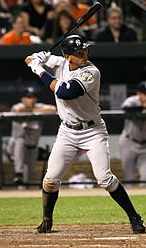
Yankees' third basemanAlex Rodriguez, 2007
In 2004, the Yankees acquired Alex Rodriguez, who moved to third base from his usual shortstop position to accommodate Derek Jeter. In the ALCS, the Yankees met the Boston Red Sox again, and became the first team in professional baseball history, and only the third team in North American pro sports history, to lose a best-of-seven series after taking a 3–0 series lead.
Main article: 2005 New York Yankees season
In 2005 Alex Rodriguez won the American League MVP award, becoming the first Yankee to win the award since Don Mattingly in 1985. The Yankees again won the AL East by virtue of a tiebreaker but lost the ALDS in five games to the Los Angeles Angels of Anaheim. The 2006 season was highlighted by a 5 game series sweep of the Red Sox at Fenway Park (sometimes referred to as the "Second Boston Massacre"), outscoring the Red Sox 49–26.[38]
Main article: 2006 New York Yankees season
Despite winning the AL East for the ninth consecutive year, the Yankees lost again in the ALDS, this time to the Detroit Tigers. After the ALDS was over, tragedy struck when pitcher Cory Lidle died when hisplane crashed into a highrise apartment building in Manhattan. Along with Thurman Munson, Lidle was the second active Yankee to be killed in a private plane crash.
Main article: 2007 New York Yankees season
On June 18, 2007 the Yankees broke new ground by signing the first two professional baseball players from the People's Republic of China to the MLB,[39] and became the first team in MLB history to sign an advertising deal with a Chinese company.[40] The Yankees' streak of nine straight AL East division titles ended in 2007, but they still reached the playoffs with the AL Wild Card. For the third year in a row, the team lost in the first round of the playoffs, as the Cleveland Indians defeated the Yankees in the 2007 ALDS. After the series, Joe Torre declined a reduced-length and compensation contract offer from the Yankees and returned to the National League as manager of the Los Angeles Dodgers.
The Core Four (2008–present)
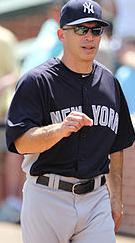
Former Yankees catcher Joe Girardibecame manager in 2008.
After Torre's departure the Yankees signed former catcher Joe Girardi to a three-year contract to manage the club.[41] The 2008 season was the last season played at Yankee Stadium. To celebrate the final year and history of Yankee Stadium, the 2008 Major League Baseball All-Star Game was played there on July 15, 2008.[42] The final regular-season game at Yankee Stadium was played on September 21, 2008.[43] After the game, Jeter addressed the crowd, thanking them for their support over the years, and urging them to "take the memories of this field, add them to the new memories that will come at the new Yankee Stadium and continue to pass them on from generation to generation."[44] Despite multiple midseason roster moves, the team was hampered by injuries and missed the playoffs for the first time in 14 seasons.
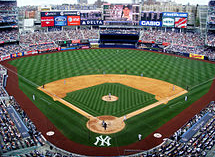
The second Yankee Stadium opened in 2009
Main articles: 2009 New York Yankees season and 2009 World Series
During the off-season, the Yankees retooled their roster with several star free agent acquisitions, including CC Sabathia, Mark Teixeira, and A. J. Burnett. At the beginning of the 2009 season, the Yankees opened the new Yankee Stadium. The Yankees set a major league record by playing error-free ball for 18 consecutive games from May 14 to June 1, 2009.[45]The Yankees finished first in the AL East. In the ALDS they defeated the Twins in a sweep before moving on to the ALCS where the Yankees defeated Angels in six games. They defeated the defending champions, the Philadelphia Phillies, in Game 6 of the World Series 7–3, to take the series 4–2, their 27th World Series title.[46]
Main article: 2010 New York Yankees season
The 2010 season featured the rivalry between the Yankees and Red Sox being revived to start and end the season. The Yankees and the Red Sox started and finished the season against each other at Fenway Park.[47][48] This was the first time since 1950 this had happened.[49] In June, Joe Torre's Dodgers played games against the Yankees for the first time since he became manager of the Dodgers, with the Yankees taking two out of three games in the series.[50] During the 2010 All-Star break, Pennsylvania announcer Bob Sheppard and principal owner George Steinbrenner died. Eight days later, another longtime Yankee icon, former player and manager Ralph Houk, died. The Yankees won the American League Wild Card. They swept the Minnesota Twins in the 2010 American League Division Series, but lost to the Texas Rangers in the 2010 American League Championship Series 4 games to 2.
In a 22–9 win over the Athletics at home on August 25, 2011, the Yankees became the first team in Major League history to hit three grand slams in a single game. They were hit by Robinson Canó, Russell Martin, andCurtis Granderson. The Yankees won the AL East title for the second time in three seasons, finishing with 97 wins and took home field throughout the AL postseason. However, they were defeated by the Tigers in five games in the 2011 American League Division Series.
The Yankees again finished the season with the AL's best record at 95–67. They faced the Orioles in the 2012 American League Division Series. In Game 3, Raúl Ibañez became the oldest player to hit two home runs in a game, the oldest to hit a walk-off homer, the first substitute position player in a postseason game to hit two home runs, and the first to hit two home runs in the 9th inning or later in a postseason game, in the Yankees' 3–2 win. The Yankees would defeat the Orioles in five games. But in the 2012 American League Championship Series, the Yankees lost to the Tigers again, this time in a four-game sweep, which was compounded with a struggling offense and a season-ending injury to Derek Jeter.
On April 12, 2013, the Yankees made their second triple play ever in a home game playing the Baltimore Orioles. It was scored as 4-6-5-6-5-3-4, the first triple play of its kind in baseball history.[51]
Distinctions

World Series rings
See also: List of New York Yankees seasons and New York Yankees award winners and league leaders
The Yankees have won a leading 27 World Series in 40 appearances (which, since the first World Series in 1903, currently amounts to an average appearance every 2.7 seasons and a championship every 4.0 seasons); the St. Louis Cardinals are second with 11 World Series victories. The Yankees' number of World Series losses, 13, leads in Major League Baseball. The St. Louis Cardinals, Brooklyn/Los Angeles Dodgers and New York/San Francisco Giants are second in total World Series appearances with eighteen apiece. Of their eighteen World Series appearances, the Dodgers have faced the Yankees eleven times, going 3–8 against the Yankees, while the Giants have faced the Yankees seven times, going 2–5 against the Yankees.[52] Among North American major sports, the Yankees' success is only approached by the 24 Stanley Cup championships of the Montreal Canadiens of the National Hockey League, though they haven't won a championship since 1993. They have played in the World Series against every National League pennant winner except the Houston Astros and the Colorado Rockies, a feat that no other team is even close to matching.[53]
Through 2010, the Yankees have an all-time regular season winning percentage of .568 (a 9670–7361 record), the best of any team in baseball.[54]
Team nicknames
The "Yankees" name is often shortened to "the Yanks." Their most prominently used nickname is "the Bronx Bombers" or simply "the Bombers", a reference to their home and their prolific hitting. A less used nickname is "the Pinstripes", in reference to the iconic feature on their home uniforms. Critics often refer to the team and the organization as "the Evil Empire", a term applied to the Yankees by Boston Red Sox president Larry Lucchino in a 2002 interview with the New York Times.[55] A term from the team's tumultuous late 70s, "the Bronx Zoo", is sometimes used by detractors, as well as the "Damn Yankees", after the musical of the same name. Ironically, even many Yankees supporters refer to their team as the "Evil Empire" as a badge of honor and in fact enjoy having their team play "the villain".
Logo, uniform, and dress code
Main article: Logos and uniforms of the New York Yankees
Popularity
Fan support
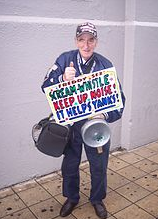
"Freddy Sez" holding one of his signs near the bleachers entrance before a game between the Yankees and Texas Rangers
With the recurring success of the franchise since the 1920s, the Yankees have been and continue to be one of the most popular sports teams in the world, with their fan base coming from much further than the New York metropolitan area. The Yankees typically bring an upsurge in attendance at all or most of their various road-trip venues, drawing crowds of their own fans, as well as home-town fans whose interest is heightened when the Yankees come to town.
The first one-million fan season was in 1920, when 1,289,422 fans attended Yankee games at the Polo Grounds. The first two-million fan season was in 1946, when 2,265,512 fans attended games at Yankee Stadium. The Yankees have beaten the league average for home attendance 83 out of the last 87 years (only during 1990, 1991, 1992 and 1994 did they not accomplish this). In the past seven years, the Yankees have drawn over three million fans each year, with an American League record-setting 4,090,696 in 2005, becoming only the third franchise in sports history to draw over four million in regular season attendance in their own ballpark.[56] The Yankees were the league leaders in "road attendance" in each year from 2001 through 2006.[57]
One famous fan was Fred Schuman, popularly known as "Freddy Sez". For over 50 years he came to Yankees' home games with a baseball cap, a Yankees' jersey (which on the back bears his own name) and a cake pan with a shamrock painted on it which was connected to a sign inscribed with words of encouragement for the home team. Fred died on October 17, 2010 at the age of 85.
To avoid unwanted publicity, Yankees members use aliases when registering for hotels. The Village Voice published a list of aliases used by Yankees members, and the contents were republished on The Smoking Gun.[58]
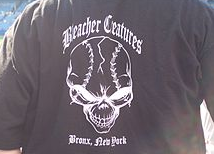
A shirt worn by a number ofBleacher Creatures
Main article: Bleacher Creatures
The "Bleacher Creatures" are a notorious group of season ticket holders who occupied Section 39 in the right field bleachers at the old Yankee Stadium, and occupy Section 203 in the new one. They are known for their strict allegiance to the Yankees, and are often merciless to opposing fans who sit in the section and cheer for the road team. They enjoy taunting the opposing team's right fielder with a series of chanting and slandering. The "creatures" got their nickname from New York Daily News columnist Filip "Flip" Bondy, who spent the 2004 season sitting in the section for research on his book about the group, Bleeding Pinstripes: A Season with the Bleacher Creatures of Yankee Stadium, published in 2005.[59]
Global expansion and business model
The Yankees baseball club is formally owned by Yankee Global Enterprises which owns the team's regional YES sports network. While the club has claimed it is operating under annual losses in excess of $47 million this figure is attributed only to the ballclub's finances and not to finances attributed to YES or Yankees Global Enterprises.
The Yankees have become well known for a winning reputation on a global level. In 2007, they reached an agreement with the Chinese Baseball Association to allow coaches, scouts and trainers to work in China to promote baseball and judge talent.[60] They are trying to do the same with the Yomiuri Giants and the Hanshin Tigers in Japan. The Yankees and Yomiuri Giants currently have a close relationship and share ideas and strategies. The Yomiuri Shimbun daily newspaper has an ad on the left-field wall at Yankee Stadium, and other Japanese ads appear on the scrolling backstop advertising board. The Yankees are hoping that close ties with countries such as China and Japan will give them personal, in depth judgments of baseball talent.[61]
In 2008, the Yankees announced a joint venture with the Dallas Cowboys that would form the basis for a partnership in running food and beverage, and other catering services to both teams' stadiums.
In 2011, Forbes magazine ranked New York Yankees as the third most valuable sports team in the world, behind Manchester United of the Premier League and Dallas Cowboys, with a value of $1.7 billion.[62]
Criticism
With the long-term success of the franchise and a large Yankee fanbase, many fans of other teams have come to dislike the Yankees.[63] The organization is sometimes referred to by detractors as "the Bronx Zoo" (echoing the title of Sparky Lyle's book) or "the Evil Empire."[63] When the Yankees are on the road, it is common for the home fans to chant "Yankees Suck", and numerous t-shirts, bumper stickers and other items have been sold with this phrase.[63]
Much of the animosity toward the team may derive from its high payroll (which was around $200 million at the start of the 2008 season, the highest of any American sports team),[64] and the free agent superstars the team attracts in the offseason. Chicago Tribune columnist Mike Royko noted, "Hating the Yankees is as American as pizza pie, unwed mothers, and cheating on your income tax."[65]
Fight and theme songs
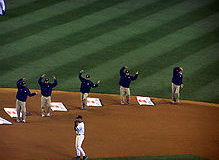
The Grounds-crew at Yankee Stadium dancing to "Y.M.C.A."
The official fight song for the Yankees is "Here Come the Yankees", written in 1967 by Bob Bundin and Lou Stallman. While it is not used as often, it is still heard frequently in instrumental form, most prominently in radio broadcasts. Another song strongly linked to the team is "New York, New York", which is played in the stadium after home games. The Frank Sinatra cover version is traditionally played after victories, and the Liza Minnelli original version after losses. When the Yankees take the field before the start of every game, 2 Unlimited's "Get Ready For This" is played, with the fans usually clapping along. When the Yankees score a run at home, a short snippet of 2 Unlimited's "Workaholic" containing the bell chime of Westminster Quarters is played.
A wide selection of songs are played regularly at the stadium, many of them live on the Stadium's Hammond organ. "God Bless America" has been played during the 7th inning stretch since September 11. The version typically played is an abbreviated version of Kate Smith's rendition. However, during many important games (including most play-off games) and on noteworthy days, it is sung live a Capella and includes a longer introduction. During the 5th inning, the grounds-crew, while performing their duties, dances to "Y.M.C.A.". "Cotton-Eyed Joe", once played during the 7th inning stretch, is now played in the 8th inning. On the DiamondVision screen, a man in farmer's garb is shown dancing in the stadium's control room, with the words "Cotton-Eyed Joey" at the bottom. The organist will sometimes play the "Zorba the Greek Theme", accompanied by clapping from the audience, to excite the crowd and encourage a rally.
Radio and television
Main article: New York Yankees broadcasters and media
The Yankees Entertainment and Sports (YES) Network launched in 2002, and serves as the primary home of the New York Yankees. Michael Kay is the play-by-play announcer and Ken Singleton, Al Leiter, John Flaherty, and Paul O'Neill work as commentators as part of a three-man, or occasionally two-man, booth. Bob Lorenz hosts the pre-game show and the post-game show, with Meredith Marakovitz and Nancy Newman as the reporters. Some games are telecast on WWOR-TV; those broadcasts are produced by YES.
Radio broadcasts are on the Yankees Radio Network, the flagship station being WCBS 880 AM, with John Sterling as the play-by-play announcer and Suzyn Waldman providing the commentary, with Spanish-language broadcasts on WADO 1280 AM.
The history of Yankee radio broadcasters is: WABC 770 (1939–'40), WOR 710 (1942), WINS 1010 (1944–'57), WMGM 1050 (1958–'60), WCBS 880 (1961–'66), WHN 1050 (1967–'70), WMCA 570 (1971–'77), WINS 1010 (1978–'80), WABC 770 (1981–2001), WCBS 880 (2002–present).
Past announcers
• Mel Allen was the team's lead announcer from 1948 to 1964.
• Red Barber called Yankees games for thirteen seasons (1954–1966).
• Frank Messer, Phil Rizzuto and Bill White teamed together in the 1970s and 1980s. Rizzuto, with 40 years in the broadcast booth, is the longest serving broadcaster in the history of the club. Messer and White each worked nearly two decades for the Yankees, with White notably moving on to become president of the National League in 1989. Bobby Murcer also called games for over twenty years, and continued with the YES network until shortly before his death from brain cancer.
Minor league affiliations
The Yankees are affiliated with the following minor league teams:[85]
| Level | Team | League | Location |
| AAA | Scranton/Wilkes-Barre RailRiders | International League | Moosic, Pennsylvania |
| AA | Trenton Thunder | Eastern League | Trenton, New Jersey |
| Advanced A | Tampa Yankees | Florida State League | Tampa, Florida |
| A | Charleston RiverDogs | South Atlantic League | Charleston, South Carolina |
| Short Season A | Staten Island Yankees | New York–Penn League | Staten Island, New York |
| Rookie | GCL Yankees1 | Gulf Coast League | Tampa, Florida |
| GCL Yankees2 | Gulf Coast League | Tampa, Florida | |
| DSL Yankees 1 | Dominican Summer League | Boca Chica, Dominican Republic | |
| DSL Yankees 2 | Dominican Summer League | Boca Chica, Dominican Republic |



















